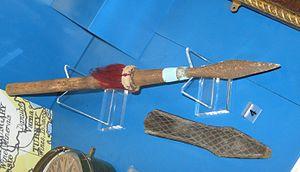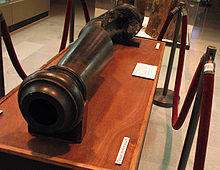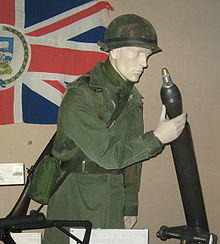

A prize of war is a piece of enemy property or land seized by a belligerent party during or after a war or battle, typically at sea. This term was used nearly exclusively in terms of captured ships during the 18th and 19th centuries.
Basis in international law
Rules defining how prizes were claimed and administered originated before there were organized government navies and were an outgrowth of privateering.[1] Current international treaties provide for the retention of personal property by captured soldiers as well as issues of personal equipment in their possession when captured (including clothing, helmets, rank insignia and medals, and protective equipment such as gas masks), but excluding certain issue items such as weapons, horses, maps, and military documents. Non-personal equipment, vehicles, artillery pieces, ships, stockpiles of food and other material belongs to the capturing state and it may be used without any restriction.[2]
Notable prize-takings

Prizes in World War II included a German submarine later called HMS Graph, and U-505 which was captured by elements of the United States Navy in a task force commanded by then-Captain Daniel V. Gallery. U-505 currently is a museum ship at the Museum of Science and Industry in Chicago.
Although not taken in combat, three Gorch Fock-class barques were confiscated from Germany as reparation prizes at the conclusion of World War II, one of which remains in US service as USCGC Eagle.
The passenger ship HMT Empire Windrush, which had a notable role in the post-war history of the United Kingdom, was originally a German ship, confiscated after the war. The Russian ship Kruzenshtern, the largest traditional sailing vessel currently in operation, was originally the German ship Padua, before being taken over by the Soviet Union in 1946.
Quantities of Iraqi military materiel captured during the Gulf War are held by US museums.[3]
Materiel captured as a result of the Falklands War was reused by the British Armed Forces. This included two Agusta A109 helicopters captured by the British Army, SAS from the Argentine Army which were used by the Army Air Corps until 2007. Oerlikon GDF-002 AA guns and Skyguard FC radars were put into service by the Royal Aux Air Force for some 10 years.
See also
- List of ships captured in the 18th century
- List of ships captured in the 19th century
- Blockade runners of the American Civil War
- Prize money
- War looting
- War trophy
References
- ^ Petrie, Donald A. Prize Game, The: Lawful Looting on the High Seas in the Days of Fighting Sail. ISBN 0-425-17829-3.
- ^ "Practice Relating to Rule 49. War Booty". Committee of the International Red Cross. Retrieved 7 June 2017.
- ^ Charles H. Bogino (17 December 1991). "Captured Iraqi Gear Tells Story Of A Military Ill-prepared To Fight". Chicago Tribune. Retrieved 7 June 2017.
